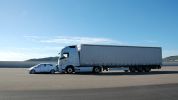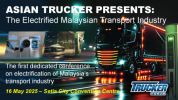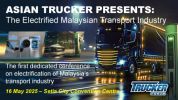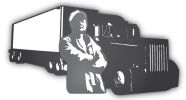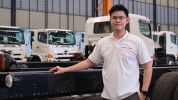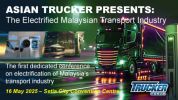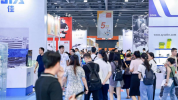Daimler Group Indonesia Announces New Entity
Daimler Group Indonesia expands its organization by introducing a new business entity, PT Daimler Commercial Vehicle Manufacturing Indonesia (DCVMI), as a result of the implementation of the new group structure, PROJECT FUTURE, by the German Daimler AG on a global scale.
The newest establishment will be primarily focusing on the production and assembly of Mercedes-Benz commercial vehicles for the Indonesian market, while PT Daimler Commercial Vehicles Indonesia (DCVI) will be serving as the sole sales agent for the distribution of Mercedes-Benz commercial vehicles. DCVMI will be expected to carry on the success that has been achieved by DCVI through the factory in Wanaherang, West Java, such as the launching of the Axor type Mercedes-Benz heavy-duty truck back in 2017, which added to the range of commercial vehicle models that are assembled locally by Daimler. Additionally, improvements such as the brake test, speedometer test, and shower test have been added to the assembly and testing facilities of the Wanaherang plant. These new additions will serve as tighter quality control of each Mercedes-Benz vehicle in ensuring its safety.
Daimler AG spent two years intensively preparing for the implementation of PROJECT FUTURE for the purpose of dividing its various businesses around the world into separate divisions. The group structure was finally launched in 2018 with the intention to begin a structural transformation that will prove to be visionary, with three independent entities under the Daimler AG umbrella: Mercedes-Benz AG (responsible for Mercedes-Benz passenger vehicles and vans), Daimler Truck AG (responsible for seven global brands of Trucks and Buses), and Daimler Mobility AG (responsible for mobility services and financial services).
Tim Grieger, Head of DCVMI, hopes that the presence of the new entity will encourage the Mercedes-Benz commercial vehicle division in Indonesia to be more focused and competitive in accordance with the functions and goals of each entity. “The structural change in this organization is part of our commitment to the market in Indonesia, with the hope of bringing success to future mobility with our sustainable business strategy in Indonesia.”
Daimler is Committed to Combating Child Labour
Daimler gets on board with education projects in India and the Congo to combat child labour and improve living conditions.
Daimler AG is taking important steps to ensure respect for human rights in the vicinity of raw-material mines. The company has joined forces with the Terre des Hommes Netherlands NGO and the Responsible Mica Initiative (RMI) to combat child labour in Indian mica mines. The cooperation with the Bon Pasteur aid organization against child labour in the Democratic Republic of the Congo, which was initiated in 2019, has achieved initial successes.
Important Steps
“For Daimler,” stated Renata Jungo Brüngger, Member of the Board of Management of Daimler AG and Mercedes-Benz AG responsible for Integrity and Legal Affairs, “the cooperation with Terre des Hommes and the Responsible Mica Initiative is an important step in combating child labour in mining regions. We will support projects in India and the Democratic Republic of the Congo with 1.2 million euros until 2022, creating future opportunities for the people there.”
Markus Schäfer, Member of the Board of Management of Daimler AG and Mercedes-Benz AG responsible for Daimler Group Research and Mercedes-Benz Cars COO added, “Social, environmental and economic aspects are the basis of Daimler’s sustainable business strategy. For us, ethically responsible raw-material extraction and processing begins right at the start of the value chain. We are intensively involved in the supply chain – going as far as into the raw-material mines.”
Terre des Hommes in India
The cooperation with Terre des Hommes Netherlands in Jharkhand, India aims to enable children in the vicinity of mica mines to attend school and to provide economic support for their families. The raw material mica is used, among other things, to achieve the shimmering effect of vehicle paints. The project aims to prevent parents from having to send their children to work in mica mines. At the same time, a good education makes it more likely that the children can earn their own living later as adults and that the family is not dependent on income from child labour.
In addition to the educational opportunities for children, local structures are to be strengthened and information is to be provided on children's rights. To this end, Daimler and Terre des Hommes Netherlands are working with regional aid organizations. The project supported by Daimler will initially run until 2022.
Consistent Action
Mr Brüngger pointed out, “We are taking consistent action against child labour with three measures: our Human Rights Respect System, on-site audits and cooperation with non-profit organizations.”
By joining the Responsible Mica Initiative, Daimler AG intends to take even more consistent action against child labour in mines. The initiative is committed to a fair, responsible and sustainable mica supply chain in India. To this end, Daimler AG is working with other companies, NGOs, industry associations and government representatives to develop standards for responsible working conditions, to strengthen local communities, and to support the establishment of a legal framework for the mica industry. The initiative aims to completely eliminate child labour and unacceptable working conditions in mica mines by 2022.
Systematic Examination of Human-Rights Risks
Daimler AG takes a systematic approach to counteracting human-rights violations early and actively. A strategic approach to respecting human rights, the Human Rights Respect System, has been developed both for its own majority-owned companies and for its supply chains. As an important measure, the company has identified potentially risky raw materials. The aim is to gradually make the supply chains for these potentially risky raw materials transparent and to take risk-based measures.
Two years ago, Mercedes-Benz Cars already made its paint supply chains transparent, audited mines and processors and traced the path of mica supplies. The project with Terre des Hommes and Daimler’s entry into the Responsible Mica Initiative complement these measures so that sustainable improvements can be achieved locally around the mica mines and beyond the boundaries of the company’s own supply chains. “At Mercedes-Benz, we follow the recommendation of NGOs and other external stakeholders not to exclude countries of origin of critical raw materials as sources of supply, but to work locally to improve the situation,” said Markus Schäfer.
Successful Start of Project in Congo
Daimler’s approach to cobalt is similar to that for mica. As a supplement to these measures, such as checks through audits in its own supply chains, in 2019 the company launched a social project against child labour in the Democratic Republic of the Congo together with the non-profit organization Good Shepherd International Foundation (GSIF). The aim is to improve the living conditions of the people in the Kolwezi mining region. The four-year project made a successful start and has reached important milestones after just over a year.
“A key component of the project with GSIF is to give the children in Kolwezi the opportunity of education and thus future prospects. Thanks to the cooperation with Bon Pasteur in Congo, more than 300 children have been able to attend school in the past twelve months,” said Renata Jungo Brüngger. More than 50 of them had previously worked in mines. In addition to schooling, the children also receive healthcare assistance.
Livelihoods for Women
Another focus is on creating alternative livelihoods, especially for women, by developing sustainable agriculture for example. More than 50 women have received training in agricultural techniques. In the first year of the project, more than two tons of crops were harvested, which is an important source of food and income for the families and thus an alternative to working in the mines. Additional milestones last year included educational advice for parents, education on children’s rights and training in conflict management to resolve disputes peacefully in the local community.
Daimler AG focuses on sustainable solutions in the creation of mobility. This includes the responsible procurement of the raw materials mica and cobalt. By supporting activities to combat child labour in India and the Congo, the company is consistently following its course of protecting human rights. Daimler will provide over 1.2 million euros in funding for this purpose by 2022.
Daimler Trucks World Premiere of Mercedes-Benz Fuel-cell Concept Truck
Daimler Trucks presented its technology strategy for the electrification of its vehicles, ranging from urban distribution to international long-haul transport, thus reaffirming its commitment to the goals of the Paris Climate Protection Convention. The event focused on the technology for hydrogen-based fuel-cell trucks for the long-haul transport segment. The Mercedes-Benz GenH2 Truck, which today had its world premiere as a concept vehicle, marks the beginning of fuel-cell drive. With the GenH2 Truck, Daimler Trucks is demonstrating for the first time which specific technologies the manufacturer is driving forward at full speed so that heavy-duty fuel-cell trucks can perform flexible and demanding long-distance haulage operations with ranges of up to 1,000 kilometers and more on a single tank of hydrogen. Daimler Trucks plans to begin customer trials of the GenH2 Truck in 2023; series production is to start in the second half of the decade. Thanks to the use of liquid instead of gaseous hydrogen with its higher energy density, the vehicle’s performance is planned to equal that of a comparable conventional diesel truck.
Daimler Trucks today also presented for the first time a preview of a purely battery-powered long-haul truck, the Mercedes-Benz eActros LongHaul, which is designed to cover regular journeys on plannable routes in an energy-efficient manner. Daimler Trucks plans to have the eActros LongHaul ready for series production in 2024. Its range on one battery charge will be approximately 500 kilometers. Additionally, with the Mercedes-Benz eActros for distribution transport, which was already presented in 2018 and has been tested intensively since then by customers in everyday transport operations, Daimler Trucks will start series production of a purely battery-powered heavy-duty truck next year. The range of the series-produced eActros on one battery charge will significantly exceed that of the prototype’s approximately 200 kilometers.
Daimler Trucks is pursuing similar vehicle schedules for the North American and Japanese markets as it is for Europe. By the year 2022, Daimler Trucks’ portfolio in its main sales regions – Europe, the USA and Japan – is to include series-produced vehicles with battery-electric drive. The company also has the ambition to offer only new vehicles that are CO2-neutral in driving operation (“from tank to wheel”) in Europe, North America and Japan by 2039.
As a new worldwide modular platform architecture, the so-called ePowertrain will be the technological basis of all medium- and heavy-duty CO2-neutral, all-electric series-produced trucks from Daimler Trucks – whether powered purely by batteries or by hydrogen-based fuel cells. It will feature high levels of performance, efficiency and durability. With the ePowertrain, Daimler Trucks plans to achieve synergies and economies of scale for all relevant vehicles and markets.
Martin Daum, Chairman of the Board of Management of Daimler Truck AG and Member of the Board of Management of Daimler AG, and Sven Ennerst, Member of the Board of Management of Daimler Truck AG for Development, Procurement and the China Region, presented the technology strategy at STATION-Berlin. The speakers included Andreas Scheuer, Federal Minister of Transport and Digital Infrastructure.
Genuine Locally CO2-neutral Alternatives for Truck Customers
Martin Daum: “We are consistently pursuing our vision of CO2-neutral transport with a focus on the genuinely locally CO2-neutral technologies battery power and hydrogen-based fuel cells, which have the potential to succeed in the market in the long term. This combination enables us to offer our customers the best vehicle options, depending on the application. Battery power will be rather used for lower cargo weights and for shorter distances. Fuel-cell power will tend to be the preferred option for heavier loads and longer distances.”
“Our customers make rational purchasing decisions and are unwilling to compromise on their trucks’ suitability for everyday use, tonnage and range. With our alternative drive concepts from Mercedes-Benz – the GenH2 Truck, the eActros LongHaul and the eActros – and our electric trucks of the Freightliner and FUSO brands, we have a clear focus on customer requirements and are creating genuine locally CO2-neutral alternatives for them. We have now set out the key technological specifications of our electric trucks so that the requirements are known to everyone involved at an early stage. It is now up to policymakers, other players and society as a whole to provide the right framework conditions. To make CO2-neutral all-electric vehicles competitive, regulatory and government action is needed, including the necessary infrastructure for charging with green electricity and for the production, storage and transport of green liquid hydrogen,” Daum continued.
Federal Minister Andreas Scheuer: “We need zero-carbon goods vehicles on our roads. These include hydrogen fuel cell trucks. There is huge potential inherent in hydrogen for the protection of our environment and a strong economy. That is why we have been funding hydrogen as a transport fuel for over ten years – one current example is the concept truck presented today. We will continue to provide strong support to the development of climate-friendly drivetrains and innovations in and for Germany. This will include, but not be limited to, significantly expanding the funding of vehicles.”
Key Figures of the GenH2 Truck Based on Conventional Long-haul Trucks
The development engineers at Daimler Trucks have based the GenH2 Truck on the capabilities of the conventional Mercedes-Benz Actros long-haul truck with regard to tractive power, range, and performance. For example, the series-production version of the GenH2 Truck is to have a gross vehicle weight of 40 tons and a payload of 25 tons. Two special liquid-hydrogen tanks and a particularly powerful fuel-cell system will make this high payload and long range possible, and therefore form the core of the GenH2 Truck concept.
Daimler experts can draw on existing expertise for the development of liquid-hydrogen tanks, and they are also cooperating closely with a partner. With regard to fuel cells, the manufacturer benefits from its experts’ decades of experience, in terms of technology as well as production methods and processes. This represents an enormous advantage. In April this year, Daimler Truck AG concluded a preliminary, non-binding agreement with the Volvo Group to establish a new joint venture for the development to series maturity, production and commercialization of fuel-cell systems for use in heavy-duty commercial vehicles and other applications. Joining forces will decrease development costs for both companies and accelerate the market introduction of fuel cell systems. The joint venture is to benefit from the expertise of Daimler Truck AG and the Volvo Group. To facilitate the joint venture with the Volvo Group, Daimler Truck AG has brought together all Group-wide fuel-cell activities in the newly founded subsidiary Daimler Truck Fuel Cell GmbH & Co. KG.
Liquid Hydrogen Enables Applications with High Energy Throughput
Daimler Trucks prefers to use liquid hydrogen (LH2), because in this state, the energy carrier has a far higher energy density in relation to volume than gaseous hydrogen. As a result, the tanks of a fuel-cell truck using liquid hydrogen are much smaller and, due to the lower pressure, significantly lighter. This gives the trucks a larger cargo space and higher payload weight. At the same time, more hydrogen can be carried, which significantly increases the trucks’ range. This makes the series GenH2 Truck, like conventional diesel trucks, suitable for multi-day, difficult to plan long-haul transport and where the daily energy throughput is high.
Daimler Trucks is currently pressing ahead with the development of the necessary tank-system technologies to make liquid hydrogen usable also in mobile applications as an energy source for series-produced fuel-cell trucks. The storage of cryogenic liquid hydrogen at -253 degrees Celsius is already common practice in stationary applications, for example in industry or at hydrogen filling stations. This also applies to the transport of liquid hydrogen as cargo.
Interaction between Battery and Fuel-cell Systems
The two stainless-steel liquid-hydrogen tanks intended for the series version of the GenH2 Truck will have a particularly high storage capacity of 80 kilograms (40 kg each) for covering long distances. The stainless-steel tank system consists of two tubes, one within the other, that are connected to each other and vacuum-insulated. In the series version of the GenH2 Truck, the fuel-cell system is to supply 2 x150 kilowatts and the battery is to provide an additional 400 kW temporarily. At 70 kWh, the storage capacity of the battery is relatively low, as it is not intended to meet energy needs, but mainly to be switched on to provide situational power support for the fuel cell, for example during peak loads while accelerating or while driving uphill fully loaded. At the same time, the relatively light battery allows a higher payload. It is to be recharged in series-production vehicles with braking energy and excess fuel-cell energy. A core element of the sophisticated operating strategy of the fuel-cell and battery system is a cooling and heating system that keeps all components at the ideal operating temperature, thus ensuring maximum durability. In a pre-series version, the two electric motors are designed for a total of 2 x 230 kW continuous power and 2 x 330 kW maximum power. Torque is 2 x 1577 Nm and 2 x 2071 Nm respectively.
Mercedes-Benz eActros LongHaul Offers Advantages Depending on Use Case
The Mercedes-Benz eActros LongHaul battery-powered long-haul truck will be in the same vehicle class as the GenH2 truck. Its features will be largely identical to those of the series-produced GenH2 Truck or a conventional diesel truck. The comparatively short range of the eActros LongHaul on one battery charge is offset by its high energy efficiency, as battery electric drive has the highest efficiency among alternative drive systems. This offers transport companies significant advantages in the application scenarios envisaged for the eActros LongHaul due to its low energy costs. Many of the long-haul applications in the practical operations of transport companies do not require a range greater than the approximately 500 kilometers that the eActros LongHaul will be able to cover on one charge. In addition, legal requirements regarding truck drivers’ driving times limit the need for longer ranges, depending on the case. In the EU, for example, truck drivers have to take a break of at least 45 minutes at the latest after 4.5 hours of driving. During this time, thanks to the latest charging technology, the battery can be charged with a large proportion of the energy needed for the ongoing journey. The eActros LongHaul will therefore be the right choice for transport companies for regular use on plannable routes and with the appropriate distances and charging possibilities.
Charging Infrastructure for eActros LongHaul can be Available Relatively Soon
With its market launch in the middle of the decade, the eActros LongHaul will be available some time before the GenH2 Truck. The required infrastructure can also be set up sooner – and at comparatively low cost – by the transport companies themselves for charging at their depots. This so-called depot charging is the most important step for the use of the eActros LongHaul, and means that the first areas of application can already be covered. Another key component is opportunity charging for range extension, for example, while unloading or loading when the electric truck is anyway stationary. In the future, public charging at publicly accessible stations along main transport routes will also become increasingly important – a nationwide charging infrastructure will maximize the operating range of battery-electric trucks. New, more durable batteries will also contribute to the competitiveness of battery-electric trucks, reducing total cost of ownership over a vehicle’s lifecycle.
Mercedes-Benz eActros to be Integrated into Comprehensive Consulting Service
At the International Commercial Vehicles Show in 2016, Daimler Trucks was the first manufacturer worldwide to present a heavy-duty electric truck. In early 2018, Daimler Trucks celebrated the world premiere of the further developed Mercedes-Benz eActros, and intensive practical tests have been taking place with customers since the fall of 2018. Since then, findings from customer testing have flowed directly into the further development of the prototype into a series-production vehicle. So far, they have shown that the purely battery-electric eActros is outstandingly suited for sustainable heavy-duty distribution transport. It is in no way inferior to a conventional diesel truck in terms of availability and performance. However, the series-production eActros will be significantly superior to the current prototype in some aspects, such as range, drive power and safely. The series-production eActros will be on a par with a conventional Actros also in terms of payload. The eActros will be launched as a two-axle and three-axle truck. Daimler Trucks will embed the vehicle in a holistic ecosystem that includes consulting services for electric mobility, such as analyzing routes, checking possible subsidies, supporting operational fleet integration and developing suitable charging-infrastructure solutions.
Daimler Trucks & Buses: Extensive Practical Expertise in Electric Drive
The first practical operation of the Mercedes-Benz eEconic low-floor truck, which is based on the eActros and was announced by Daimler Trucks this year, is planned for 2021 and series production is scheduled to start in 2022. The eEconic will mainly be used as a waste-collection vehicle in urban waste-management applications. This is a very good choice for battery-powered trucks due to the comparatively short and firmly planned routes of up to about 100 kilometers and a very high proportion of stop-and-go operation. In the United States, the medium-duty Freightliner eM2 and the heavy-duty Freightliner eCascadia are also currently undergoing practical tests with customers. The vehicles have a target range for series production of up to 370 km (eM2) and up to 400 km (eCascadia). Series production of the eCascadia is scheduled to start in mid-2022 and of the Freightliner eM2 in late 2022. A small series of more than 170 FUSO eCanter light-duty trucks are in use in with numerous customers in Japan, the United States and Europe; the first of them were handed over to customers already in 2017. The eCanter offers a range of 100 km. At Daimler Buses, the Mercedes-Benz eCitaro has been in series production since the fall of 2018. It will be followed in 2022 by the version with fuel cells as a range extender. With nearly 400 vehicles in use with customers, Daimler Trucks & Buses has gained comprehensive, practice-oriented expertise with electric vehicles, and has recorded a total of well over seven million kilometers driven by battery-electric test and series-produced trucks and buses with customers worldwide.
Modular ePowertrain for Various Markets and Segments
Within the context of its global platform strategy, Daimler Trucks is also using a globally uniform basic architecture for all-electric trucks: the ePowertrain. The technological heart of the ePowertrain is, as a first step, the integrated electric drive, the so-called eDrive. This is used in the form of an e-carrier concept, i.e., an e-axle with one or two integrated e-motors including transmission. The eDrive is an in-house development by Daimler experts and offers numerous advantages over concepts with one central motor. For example, the more compact design allows a larger space to install a larger battery with a higher capacity, which has a positive effect on range. The high battery capacity also ensures high power transmission to the e-axle, thus allowing continuous power delivery. The recuperation potential also increases due to the combination of a large battery with very powerful e-motors. The eDrive is to be applied in various vehicles at Daimler Trucks in the medium- and heavy-duty segment worldwide – whether with purely battery-electric or hydrogen-based fuel-cell drive. The eDrive is designed as a drive family consisting of different variants, the first of which will have its premiere in the series-produced version of the Mercedes-Benz eActros. Within a modular system, the eDrive can be tailored to suit the market, segment and vehicle type.
The global concept of the modular ePowertrain thus creates synergies with regard to technology developments for different markets and segments, as well as economies of scale through larger numbers of uniform components. This in turn results in competitive costs that can be passed on to customers. In addition, a high proportion of components taken over from conventional powertrains is planned to contribute to competitive development and production costs.
Daimler Trucks’ Consulting Approach Reflects New Drive-system Complexity
In the coming years, truck customers will face the challenge of choosing the drive technology that is best for them – depending on the industry, segment and specific application. The goal of Daimler Trucks’ consultants is to meet this gradually increasing complexity with tailored offers at the right time. They will accompany customers every step of the way and work together to develop suitable solutions for entry into electric mobility. The core of Daimler Trucks’ consulting approach to the electrification of truck fleets is that the aspects of vehicle range and charging infrastructure are treated as a single entity. The experts at Daimler Trucks therefore also look in detail at how the charging infrastructure and charging processes themselves can be optimized.
With its approach to the electric-mobility ecosystem, Daimler Trucks is pursuing a holistic and global method that focuses on individual customer needs. The manufacturer is cooperating with specialized partners in all relevant sectors to offer customers access to the required components. At the beginning of the year, Daimler Trucks took an additional step by launching a worldwide initiative to establish a charging infrastructure for battery-electric trucks. Within the framework of the eTruck Charging Initiative, Daimler Trucks is bringing together the main players – electric-truck customers, power-grid operators and energy suppliers, as well as charging-hardware manufacturers and charging-software providers – and is thus driving forward joint infrastructure solutions for electric-truck customers within the network.
Daimler Trucks World Premiere of Mercedes-Benz Fuel-cell Concept Truck
马来西亚五十铃( Isuzu Malaysia)位于东马的第一家中型和重型卡车(MHD)代理服务中心正式开幕。
这家名为Dai Max Automobile的MHD 卡车代理服务中心位于砂拉越古晋,它提供销售、售后服务和零部件(3S级别)给客户,其地理位置也极具优势,靠近工业区。
MHD卡车代理服务中心于9月30日进行了一场开幕仪式,出席嘉宾包括马来西亚五十铃高层管理人员及Dai Max Automobile私人有限公司的主管。
在开幕仪式上,马来西亚五十铃首席执行员中村幸滋(Koji Nakamura)说:“马来西亚五十铃很高兴能在古晋开设第一家MHD卡车代理服务中心,以履行为东马客户提供服务的承诺,并且加强我们的售后服务及大幅提高客户对我们的满意度和信任度。”
这家代理服务中心占地面积3000平方米,修车间占了650平方米。
中村幸滋续称:“这家代理服务中心要提供卓越的销售和服务体验给当地客户,并且满足他们的需求。有了这座位于优越地理位置的大型设施,我们便可以为东马客户提供绝佳服务,从而提高他们的业务效率。”
据马来西亚五十铃介绍,Dai Max Automobile私人有限公司花了5年时间来完善这家代理服务中心,并根据最新的车间设计和设施建造,提升待修卡车的移动流畅度。
此外,代理服务中心也备有3个供皮卡车和轻型卡车使用的车间,以及两个供中型和重型卡车使用的车间。MHD卡车代理服务中心也拥有充足的停车位及实用的维修车间,方便技术人员检测卡车。
MHD卡车代理服务车间配备五十铃最新的诊断工具,零部件及训练有素的技术人员,他们能迅速检测和修复各种卡车问题,让客户享有更短的卡车停驶时间,从而提高业务效率。
DCVT '2020 Moving Forward Together' Dealer Convention Inspires Teamwork
DCVT Reveals New Dealership Opportunities in Selected Thailand Provinces
Daimler Commercial Vehicles Thailand Ltd. (DCVT), an official distributor of FUSO trucks and Mercedes-Benz commercial vehicles, announces select opportunities for interested truck business investors to open dealerships in preferred Thailand locations. As part of its continuing expansion into the Thai market, DCVT looks to address existing sales and support gaps by providing convenient, full-service dealerships country-wide. Investors can take advantage of a full range of support systems and proprietary programs from DCVT and by Mercedes-Benz Leasing Thailand, whether they choose a FUSO dealership or a multi-brand dealership that includes FUSO and Mercedes-Benz trucks and buses. The opportunity offers support for both investors and retail customers, including comprehensive assistance from DCVT’s consultant team and a full range of proven programs including vehicle sales, marketing, after sales and customer satisfaction.
Dua Pengedar Baharu Sertai Rangkaian Luas Isuzu Malaysia
Terkini, seiring dengan pelan perkembangan syarikat, Isuzu Malaysia Sdn Bhd telah meluaskan rangkaian cawangan kenderaan komersial di seluruh Malaysia dengan penambahan dua lagi pengedar sah baharu. Pengedar sah tersebut ialah GB Motors Sdn Bhd yang terletak di Taiping, Perak; dan Truck Venture Sdn Bhd yang berpusat di Petaling Jaya, Selangor.
Cawangan bagi kedua-dua pengedar ini terletak di lokasi strategik bagi memudahkan para pelanggan di kawasan tersebut, selain menawarkan pelbagai pilihan kenderaan komersial yang bersesuaian dengan keperluan perniagaan yang berbeza.
GB Motors Sdn Bhd, yang berlokasi di Jalan Simpang, Taiping, telah memulakan operasi perniagaan mereka sejak Februari 2020. Dari segi jualan, fokus cawangan ini lebih kepada menawarkan trak komersial Tugas Ringan dan trak pikap. Di samping itu, cawangan GB Motors ini juga menawarkan khidmat kemudahan pusat 3S yang merangkumi jualan, servis selepas jualan dan alat ganti bagi memenuhi permintaan pemilik trak Isuzu di kawasan Utara.
Sementara itu, Truck Venture Sdn Bhd menawarkan pilihan lengkap kenderaan komersial Isuzu di bilik pameran mereka yang berlokasi di Seksyen 51A, Petaling Jaya. Truck Venture telah mula beroperasi sejak Mei tahun ini dan yakin bahawa syarikat mereka mampu berkembang secara positif, dengan pembukaan semula ekonomi secara stabil dan berperingkat selepas Perintah Kawalan Pergerakan Pemulihan diisytiharkan.
Menurut Koji Nakamura, selaku Ketua Pegawai Eksekutif, Isuzu Malaysia Sdn Bhd, “Melalui rangkaian pengedar sah kami yang sentiasa berkembang, dan sejajar dengan visi syarikat untuk tahun 2020, iaitu ‘Hanya yang Terbaik untuk Anda’, kami di Isuzu Malaysia bertekad untuk menawarkan produk berkualiti tinggi dan dipercayai, di samping perkhidmatan selepas jualan yang professional, bagi memastikan kepuasan pelanggan”.
Buat masa ini, dengan pertambahan cawangan GB Motors Sdn Bhd dan Truck Venture Sdn Bhd, Isuzu Malaysia mempunyai sejumlah 11 cawangan di Zon Tengah, sembilan cawangan di Zon Utara, 10 cawangan di Zon Selatan dan tujuh cawangan di Zon Pantai Timur. Selain itu, Isuzu Malaysia juga mempunyai beberapa cawangan di Malaysia Timur, dengan tujuh cawangan yang terletak di Sabah, dan tujuh lagi di sekitar Sarawak.
First Batch of 10 Electric Buses Delivered in Singapore
First ELF Truck Handover for New Isuzu Malaysia Authorised Dealer
Truck Venture Sdn Bhd, a new Isuzu Malaysia authorised dealer, has successfully made its first handover recently. An official handover ceremony was held at their showroom in Petaling Jaya, to commemorate the procurement of one unit of Isuzu ELF Light Duty 6-wheeler model by LOM Logistics Sdn Bhd.
LOM Logistics Sdn Bhd is a freight forwarding and transportation company, with its operation mainly focusing on the Water Transportation sector. The newly procured ELF Light Duty truck is a new addition to their current fleet, and is expected to strengthen their nationwide logistics presence.
The procured unit, an Isuzu ELF Light Duty 6-wheeler, offers ‘Smoother’ – Isuzu’s original automated manual transmission (AMT) that provides a more efficient and smoother driving experience, aside from reduced maintenance costs, improved fuel efficiency and a higher level of safety, resulting in a more cost-effective operation for businesses in the long run.
During the handover ceremony, Koji Nakamura, Chief Executive Officer of Isuzu Malaysia Sdn Bhd, took the opportunity to convey his appreciation to LOM Logistics Sdn Bhd for their trust and support shown through their preference for the Isuzu brand name during this challenging economic period. Nakamura is confident that this procurement will further fortify LOM Logistics’ plans of business expansion.
Later, to commemorate the special occasion, Nakamura presented a symbolic mock key and an appreciation gift in the form of an Isuzu Miniature Truck to LOM Logistics Sdn Bhd Manager, Lee Sanghaag. The ceremony was also attended by Atsunori Murata, Chief Operations Officer of Isuzu Malaysia. Also in attendance were representatives from Truck Venture Sdn Bhd, including Loo Siok Yee, Consultant Director, and Loo Siok Hua, Sales Manager.
Truck Venture Sdn Bhd, which began its operation recently in May this year, offers Isuzu’s full commercial vehicle line-up, and is conveniently located in Section 51A, Petaling Jaya, Selangor.
FUSO Distributor in Indonesia Begins Online Vehicle Sales to Boost Product Accessibility
Mitsubishi Fuso Truck and Bus Corporation (MFTBC; headquarters: Kawasaki City, Kanagawa Prefecture; President and CEO Hartmut Schick), announces the start of online vehicle sales in Indonesia by local joint venture and FUSO distributor PT Krama Yudha Tiga Berlian Motors (KTB; headquarters: Jakarta, Indonesia; President Director Naoya Takai).
Customers in Indonesia are now able to purchase a FUSO truck on Tokopedia, the largest online marketplace platform in the country. KTB launched the official Mitsubishi Fuso store on Tokopedia earlier this month. All models and variants available locally can now be purchased through Indonesia’s most accessed ecommerce service, which 1 in 3 Indonesians are said to visit every month.
This is the first time that new vehicles sales can be conducted completely online within a major market for the FUSO brand. The Tokopedia account is currently connected to 22 dealer groups within the KTB sales network, covering about 85% of the local dealer network servicing eight regions of Indonesia: North Sumatra, South Sumatra, Jabodetabek, West Java, Central Java, East Java, Kalimantan, as well as the eastern areas of Indonesia.
The launch of online retail activities is part of KTB’s commitment to provide easy access to customers in the midst of the COVID-19 pandemic and related social distancing measures. Customers are free to choose between in-store pickup or delivery when purchasing a truck or bus through Tokopedia. Reception among customers has been positive, and this growth in FUSO’s online presence is expected to make a positive contribution to Mitsubishi Fuso’s sales performance. FUSO trucks sold in Indonesia are shipped as knock-down kits (KD) from the MFTBC plant in Kawasaki, Japan, before they are locally assembled by PT Krama Yudha Ratu Motors (KRM) in East Jakarta.
They are then distributed through PT Krama Yudha Tiga Berlian Motors (KTB), a local joint venture with Mitsubishi Corporation. KTB has been integral to the continuation of the FUSO brand’s long history in Indonesia, where it has been the market leader for the past 50 consecutive years. Despite the spread of the novel coronavirus and its impact on the economy, FUSO recorded a 48.7 percent share of the Indonesian commercial vehicles market during the period of January to August 2020. The Indonesian archipelago currently represents the largest export market for FUSO vehicles.
FUSO eCanter รถบรรทุกไฟฟ้าจาก ฟูโซ่ ใช้งานจริงในนครอัมสเตอร์ดัม
Geodies Eyes Southeast Asian Network
Rene Bach-Larsen, ASEAN Sub-regional Managing Director said: “As the region’s road infrastructure continues to improve beyond the Singapore-KL-Bangkok route, scheduled road transits will become an increasingly attractive option, being faster than sea and cheaper than air.” The company said the Geodis road network (GRN) would offer scheduled departures for consignments along the Singapore-Kuala Lumpur-Bangkok route, with multimodal gateway services beyond these hubs. The scheduled service will hub at Singapore, Kuala Lumpur, Penang and Bangkok.
An on-carriage service is then offered to all major cities in Malaysia, Thailand, Cambodia and Vietnam, with a plan to extend the ‘line-haul’ service to other hubs within those countries, as well as Laos and Myanmar later in the year. Shippers would have “end-to-end control of consignments from first to last mile”, while the deployment of Geodis’s trucking assets would “minimise delays at border crossings, heightens security and gives assurance of reliable transit times”.
Alan Miu, regional director of customs brokerage of truck & rail, explained: “Our customs control tower solution gives peace of mind to our customers. A single Geodis point of contact advises each of our clients before and during transits on customs and other necessary documentation, assisting with electronic lodging of declarations in advance to avoid delays. This also makes customers completely aware of their shipment’s progress through GPS monitoring, contingency planning if necessary and final, ‘signed-for’ delivery.”
Onno Boots, Asia Pacific Chief Executive who in a previous role as Asia-Pacific Managing Director of TNT Express (prior to its acquisition by FedEx) was an early pioneer of road freight networks in Southeast Asia said “We believe that our client-centric and employee-driven approach provides the foundations of a successful future for Geodis and our customers by adapting to the transformations in the logistics industry that we are seeing. Our investment in, and operation of GRN, are prime examples of this philosophy in action. Its development has been led by identifying a gap in the market; it is enabled by good data communication and implementation by our dedicated people.”
Get Them All: Access our Magazines without Registration
We have decided to make the access to our magazines easier. All PDFs and bonus material can now be accessed without registration:
The entire library of the Malaysia edition:
Grab Haulier: Connection between Freight and Transporter
There are many ways to bring a willing buyer and a willing seller together. In the case of haulage, there is always someone looking for a counterpart and here again, technology can bridge the divide. Homegrown brand Grab Haulier Sdn Bhd has spent years to get things right with coming up with a solution that is easy to use as well as beneficial for all parties involved. Kelvin Kang, Founder and General Manager and Lin Swee Khek, Chief Technology Officer let us in on the workings of their platform (www.grabhaulier.com).
According to Kang, Grab Haulier is inspired by sharing economy which uses technology to match services and goods with customers via platforms. This model has certainly changed many industries such as Grab for ride-hailing (i.e. transportation), AirBnB for accommodation (i.e. hospitality) and Lazada for e-commerce (i.e. online shopping). This is the revolution which Kang envisions to bring to the logistic industry.
Forwarders holding jobs are constantly on the lookout for equipment owners, the hauliers whilst finding freight forwarders with the need for haulage services are what operators are looking for. Bringing these two parties together is the backbone of the business. Having worked in haulage, Kang also aims to streamline operations by eliminating paperwork and unnecessary phone calls to find the appropriate counterpart, which in his view there is way too much time and effort wasted in the traditional way of moving containers.
Adaption from Leaders
Depending on how urgent a need is, there would be express and standard offers, just as DHL would offer their service for couriers. “Nowadays, the business is instant and people are getting used to the idea that services are performed immediately.” As a platform, the pricing structure of Grab Haulier is to be transparent with no hidden cost for both freight forwarder and hauliers. For every job posted, the hauliers are instantly informed of this job availability and freight forwarders will get notification once the job is match. Once the haulier is committed to carry out the work, customers can access the truck and driver’s details.
As an idea, this may sound simple, but executing this into an operational yet user-friendly app has taken three years now. When talking about Grab Haulier, there are actually three distinctively different user interfaces. One is for the freight forwarders, one for the hauliers and the third is for drivers. As the drivers would be the ones executing the delivery but not negotiating the deal, they need to have a way to update the status of each job. “Developing such a platform takes a long time as we need to study how the industry currently works. We had to address the needs of the various players in the market,” Lin said. Two challenges presented itself when developing the app as the team found out that drivers may not be using smart phones in the same way others may. Also, to making an app simple to use is actually rather complicated.
Technicalities
Besides that, storage needs to be arranged and the decision for either own servers or cloud computing is one that can influence the performance. While taking away paper work from the users, as a platform owner, Grab Haulier has to be concerned with cyber security. Hence, they have opted for one of the five biggest providers of cloud computing, feeling that the strength in numbers would be an advantage in the fight against hacks and other malicious conduct. Prior to its official launch, the system has been repeatedly tested in its staging version to ensure the security is not compromised. This remains a top priority of Grab Haulier. Since the launch of the Grab Haulier platform a year ago, various freight forwarders and hauliers have signed up and embraced this new frontier of logistics. With users’ feedback and everchanging technological landscape, the team at Grab Haulier are constantly on the lookout on how to improve the platform.
Lin elaborated on this by saying that he and his team of programmers strives to make the app as user friendly and intuitive as possible. “Should an app be difficult to use, people will not use it since the work to use it outweighs the benefits of using it. So far, we have had some good feedback on our system. It works!”. With an in-house team of programmers, feedback can swiftly be converted into actions to improve the platform. Feedback extends into quality control issues where users may have problems with their respective partners. Grab Hauliers will then investigate what the root cause of the discontent and moderate between parties involved.
Focused for Success
For now, Grab Haulier will only focus on the haulage segment specifically in Port Klang. This is to further develop the system and to gain more insights in the intricacies of the business before expanding to other ports throughout Malaysia. “We also have to understand that a move to an online based business is also a change in corporate culture and behaviour. It takes convincing first and then educating of how to best make use of new technology.” To encourage users to give it a try, Kang pointed out that there is also an option to state price that someone is willing to pay for services. It is then up to the other party to accept it.
Next steps would be to even further enhance the system. “For example, every container has a dedicated identification number. If we scan this, then we can track and trace the entire journey of the container online, thus provide real time updates and reducing paper usage further to streamline operations for efficiency and effectiveness,” Lin said with a glimpse given into the future of the app. Kang and Lin are hopeful to capture about 30 percent of the Port Klang market share. “We need to be realistic. Not everyone is open to technological change and they will continue using their traditional system and methods. We may not be able to convince everyone but the fact remains that change is inevitable. As such, we trust time will allow GrabHaulier to prove itself to the industry players”
Kang and Lin hope that the market will respond positively and that their solution can be expanded. “Our vision is be the industry standard in service for our users, both freight forwarder and hauliers. This can be further accelerated with the necessary investments and support from the industry.
Great Initiatives from Sarawak Government on Improving State Bus Service
Greater Health and Traffic Safety: Well Equipped for the Cold Season with the New MANN-FILTER FreciousPlus
After the warm season with its high pollen levels, now is the time to change the cabin air filter. However, this is something vehicle fleet operators and drivers often overlook when preparing their vehicles for the cold season. “Replacing the cabin air filter for the cold season is very important, because it filters harmful particles and viruses from the outside air taken into the vehicle. Particularly in fall and winter the cabin air filter needs to deliver peak performance for a clear view and good air quality in the vehicle. After all, hundreds of thousands of liters of air per hour flow into the driver's cab through the filter, air conditioning system or heating system and fan," says Jens Weine, Cabin Air Filter Product Manager at MANN-FILTER. "As well as switching over tires and buying anti-freeze, drivers should also make sure to change the cabin air filter." The current situation with COVID-19 and the fact that airborne transmission is one of the main ways the coronavirus spreads once more highlight the importance of clean ambient air.
MANN-FILTER FreciousPlus: High-performing and Reliable
The FreciousPlus cabin air filter improves the air quality thanks to its different layers. In addition to coarse particles like dust and tire dust, it also filtersviruses and deleterious particulate matter. It virtually completely adsorbs unpleasant odors and harmful gases like nitrogen oxide and ozone from the airflow. An innovative biofunctional special coating has both an anti-allergen and antimicrobial effect and verifiably reduces the growth of microorganisms like mold or bacteria on the filter.
A quick and easy upgrade
MANN-FILTER supplies the FreciousPlus in customary OEM quality. For many vehicles, the filter upgrade is an easy one. When changing the filter the mechanic inserts the more effective FreciousPlus instead of the old cabin air filter, with no additional effort required.
Like wearing a face covering, a cabin air filter does not count as "personal protective equipment". It provides cleaner air in the vehicle interior and thus should be regarded as an additional protective measure. Due to the high mileage in the commercial sector, the cabin air filter should be changed every six months to operate at full efficiency
H2Accelerate – New Collaboration for Zero Emission Hydrogen Trucking at Mass-market Scale
IVECO, Daimler Truck AG, OMV, Shell and the Volvo Group today committed to work together to help create the conditions for the mass-market roll-out of hydrogen trucks in Europe.
As a growing number of governments and businesses align on a common vision of a net-zero emissions energy system, the H2Accelerate participants believe that hydrogen is an essential fuel for the complete decarbonisation of the truck sector.
Achieving a large-scale roll-out of hydrogen fuelled trucks is expected to create new industries: zerocarbon hydrogen production facilities, large-scale hydrogen distribution systems, a network of highcapacity refuelling stations for liquid and gaseous hydrogen, and the production of the hydrogen fuelled trucks. H2A participants believe that synchronized investments across the sector during the 2020s will create the conditions for the mass market roll-out of hydrogen fuelled heavy duty transportation which
is required to meet the European ambition of net zero emissions by 2050.
The decade long scale-up is expected to begin with groups of customers willing to make an early commitment to hydrogen-based trucking. These fleets are expected to operate in regional clusters and along European high capacity corridors with good refuelling station coverage. During the decade, these clusters can then be interconnected to build a truly pan-European network.
Throughout the scale up, support from the public sector will be required. Under H2Accelerate, the participants expect to work together to seek funding for early pre-commercial projects during the first phase of the roll-out. In parallel, the participants will engage with policy makers and regulators to encourage a policy environment which will help support the subsequent scale up into volume manufacturing for hydrogen trucks and a Europe-wide refuelling network for zero carbon hydrogen
fuel.
Comments from participants:
Gerrit Marx, President Commercial & Specialty Vehicles at CNH Industrial, stated: “The widespread adoption of hydrogen fuel-cell technology in heavy-duty transport is a function of the necessary infrastructure. We also need very concrete projects to demonstrate with hauliers and other stakeholders in the industry that this solution is financially and operationally viable. The groundbreaking H2Accelerate collaboration will create the conditions for this to happen and accelerate the transition to zero-emission transport.”
“The prize is clear. By boosting scale in a big way, hydrogen fuelled trucks will need to become available to customers at or below the cost of owning and operating a diesel truck today. This means truck customers will need to have access to a fully zero emissions vehicle with a similar refuelling time, range and cost range compared to the vehicles in use today. To achieve this ambition a clear regulatory framework is needed, including policies addressing the supply of hydrogen, hydrogen fuelled trucks,
refuelling infrastructure and consumer incentives in a coordinated way,” said Elisabeth Brinton, Executive Vice President for New Energies at Shell.
About H2Accelerate
H2Accelerate is a collaboration agreement signed between the participants under which the participants will work together to:
• seek public support to fund early pre-commercial projects to activate the market on the path towards a mass market roll-out;
• communicate around the technical and commercial viability of hydrogen fuelled trucking at scale;
and
• hold discussions with policy makers and regulators to encourage policies which can support a sustainable and speedy activation of the zero emissions long haul trucking market.
About the Companies Involved
IVECO
IVECO designs, manufactures and markets a wide range of light, medium and heavy commercial vehicles, off-road trucks, and vehicles for applications such as off-road missions. IVECO is investing in electric and hydrogen technology with driveline specialist FPT Industrial, also part of CNH Industrial, and through its partnership with Nikola Corporation.
Shell New Energies NL B.V.
The Royal Dutch Shell Group of Companies are working to support the development of a global hydrogen market by creating an end-to-end business stretching from solar and wind to hydrogen production and finally supplying a growing range of customers in transport, heavy industry and other hard-to-decarbonise sectors.
Daimler Truck AG
In September 2020, Daimler Truck AG celebrated the world premiere of the fuel-cell concept truck Mercedes-Benz GenH2 Truck. It is conceptualized with liquid hydrogen for flexible and demanding long-distance haulage operations with ranges of up to 1,000 kilometers and more on a single tank of hydrogen with its series version. Daimler Truck AG plans to begin customer trials of the GenH2 Truck in 2023; series production is to start in the second half of the decade. In November, the Volvo Group
and Daimler Truck AG signed a binding agreement for a joint venture to develop, produce and commercialize fuel-cell systems.
OMV Aktiengesellschaft
OMV produces and markets oil and gas, innovative energy and high-end petrochemical solutions – in a responsible way. Sustainability is an integral part of OMV’s corporate strategy. OMV supports the transition to a lower-carbon economy and has set measurable targets for reducing carbon intensity and introducing new energy and petrochemical solutions.
Volvo Group and Hydrogen
Volvo Group’s ambition is that 100% of our products are fossil fuel free enabled from 2040. There will be a gradual shift into electric, both battery and fuel cell electric. For use cases with heavier loads or longer distances, hydrogen fuel cells will be an important technology. The two technologies complement each other and both will be needed in order for us to build the sustainable transport system of tomorrow. In November, the Volvo Group and Daimler Truck AG signed a binding agreement for a joint venture to develop, produce and commercialize fuel-cell systems.
Hengst Filtration Acquires the Hydraulic Filtration Business of Bosch Rexroth AG
Hengst is about to acquire the hydraulic filtration business of Bosch Rexroth AG. This includes the site in Ketsch (Baden-Württemberg, Germany) with approximately 190 employees and the worldwide sales activities in more than 30 countries. In addition to the hydraulic filter know-how, more than 40 industrial property rights will also be transferred. Bosch Rexroth’s hydraulic filter business develops and produces complete filters and filter elements for industrial and mobile hydraulic applications.
With this additional acquisition Hengst Filtration is consistently continuing the growth and expansion of the "Industrial Filtration" division, which commenced with the take-over of Nordic Air Filtration (2016) and Delbag (2018).
The purchase agreement was signed on 07/16/2020. The transaction is subject to anti-trust approvals. Consequently, the transaction is expected to be finalized in early 2021. The parties have agreed not to disclose the amount of the purchase price.
Hengst Filtration is an internationally active, family-owned and operated business headquartered in Münster, Germany with more than 3 000 employees working at 20 locations around the world, and a leader in the field of filtration and fluid management. Hydraulic filtration solutions constitute an optimal supplementation of the existing portfolio. Hengst has been developing technologically demanding filtration solutions for more than 60 years, amongst others in the area of oil filtration, to guarantee long and safe runtime of engines and systems.
Bosch Rexroth AG is a leader in industrial and mobile hydraulics, as well as drive and control technology; since 2008 the enterprise has been active in the hydraulic filtration business.
